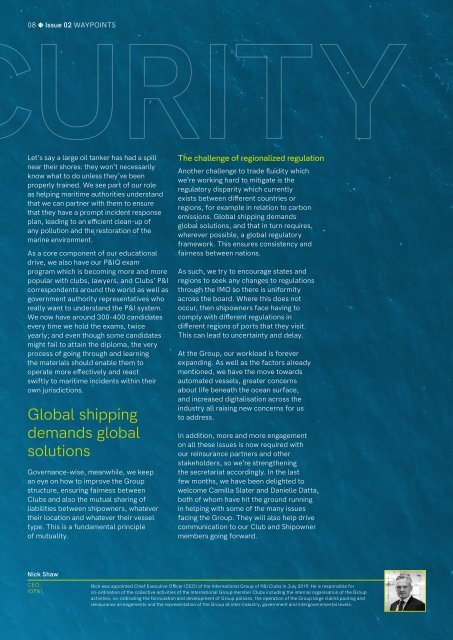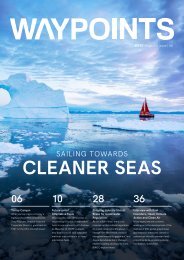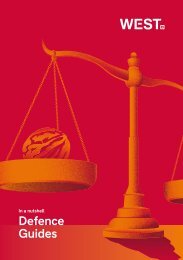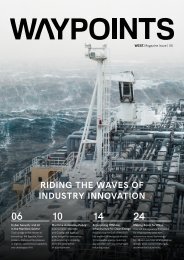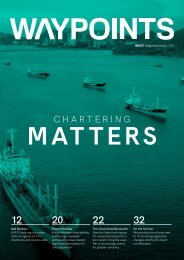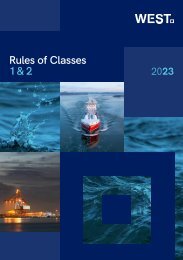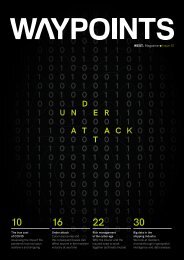Waypoints Issue 02: Wellness at Sea, Wellness on Shore
The second issue of Waypoints magazine takes the mental health of mariners as its focus. Our staff outline beneficial techniques for self-awareness and reflection, highlight compassionate crew welfare policies, look at amendments to the Maritime Labour Convention designed to protect seafarers abandoned by their employers, and emphasise the critical importance of the next steps. Also included are features on the International Group’s ongoing work to provide consistent cover for its stakeholders irrespective of global trading fluctuations, and the wisdom of implementing delay insurance. Our New York branch comes under the office profile spotlight, and we present another round-up of recent arbitrations.
The second issue of Waypoints magazine takes the mental health of mariners as its focus. Our staff outline beneficial techniques for self-awareness and reflection, highlight compassionate crew welfare policies, look at amendments to the Maritime Labour Convention designed to protect seafarers abandoned by their employers, and emphasise the critical importance of the next steps. Also included are features on the International Group’s ongoing work to provide consistent cover for its stakeholders irrespective of global trading fluctuations, and the wisdom of implementing delay insurance. Our New York branch comes under the office profile spotlight, and we present another round-up of recent arbitrations.
Create successful ePaper yourself
Turn your PDF publications into a flip-book with our unique Google optimized e-Paper software.
08<br />
<str<strong>on</strong>g>Issue</str<strong>on</strong>g> <str<strong>on</strong>g>02</str<strong>on</strong>g> WAYPOINTS<br />
WAYPOINTS <str<strong>on</strong>g>Issue</str<strong>on</strong>g> <str<strong>on</strong>g>02</str<strong>on</strong>g> 09<br />
BRIEFCASES<br />
Let’s say a large oil tanker has had a spill<br />
near their shores: they w<strong>on</strong>’t necessarily<br />
know wh<str<strong>on</strong>g>at</str<strong>on</strong>g> to do unless they’ve been<br />
properly trained. We see part of our role<br />
as helping maritime authorities understand<br />
th<str<strong>on</strong>g>at</str<strong>on</strong>g> we can partner with them to ensure<br />
th<str<strong>on</strong>g>at</str<strong>on</strong>g> they have a prompt incident resp<strong>on</strong>se<br />
plan, leading to an efficient clean-up of<br />
any polluti<strong>on</strong> and the restor<str<strong>on</strong>g>at</str<strong>on</strong>g>i<strong>on</strong> of the<br />
marine envir<strong>on</strong>ment.<br />
As a core comp<strong>on</strong>ent of our educ<str<strong>on</strong>g>at</str<strong>on</strong>g>i<strong>on</strong>al<br />
drive, we also have our P&IQ exam<br />
program which is becoming more and more<br />
popular with clubs, lawyers, and Clubs’ P&I<br />
corresp<strong>on</strong>dents around the world as well as<br />
government authority represent<str<strong>on</strong>g>at</str<strong>on</strong>g>ives who<br />
really want to understand the P&I system.<br />
We now have around 300-400 candid<str<strong>on</strong>g>at</str<strong>on</strong>g>es<br />
every time we hold the exams, twice<br />
yearly; and even though some candid<str<strong>on</strong>g>at</str<strong>on</strong>g>es<br />
might fail to <str<strong>on</strong>g>at</str<strong>on</strong>g>tain the diploma, the very<br />
process of going through and learning<br />
the m<str<strong>on</strong>g>at</str<strong>on</strong>g>erials should enable them to<br />
oper<str<strong>on</strong>g>at</str<strong>on</strong>g>e more effectively and react<br />
swiftly to maritime incidents within their<br />
own jurisdicti<strong>on</strong>s.<br />
Global shipping<br />
demands global<br />
soluti<strong>on</strong>s<br />
Governance-wise, meanwhile, we keep<br />
an eye <strong>on</strong> how to improve the Group<br />
structure, ensuring fairness between<br />
Clubs and also the mutual sharing of<br />
liabilities between shipowners, wh<str<strong>on</strong>g>at</str<strong>on</strong>g>ever<br />
their loc<str<strong>on</strong>g>at</str<strong>on</strong>g>i<strong>on</strong> and wh<str<strong>on</strong>g>at</str<strong>on</strong>g>ever their vessel<br />
type. This is a fundamental principle<br />
of mutuality.<br />
Nick Shaw<br />
CEO,<br />
IGP&I<br />
The challenge of regi<strong>on</strong>alized regul<str<strong>on</strong>g>at</str<strong>on</strong>g>i<strong>on</strong><br />
Another challenge to trade fluidity which<br />
we’re working hard to mitig<str<strong>on</strong>g>at</str<strong>on</strong>g>e is the<br />
regul<str<strong>on</strong>g>at</str<strong>on</strong>g>ory disparity which currently<br />
exists between different countries or<br />
regi<strong>on</strong>s, for example in rel<str<strong>on</strong>g>at</str<strong>on</strong>g>i<strong>on</strong> to carb<strong>on</strong><br />
emissi<strong>on</strong>s. Global shipping demands<br />
global soluti<strong>on</strong>s, and th<str<strong>on</strong>g>at</str<strong>on</strong>g> in turn requires,<br />
wherever possible, a global regul<str<strong>on</strong>g>at</str<strong>on</strong>g>ory<br />
framework. This ensures c<strong>on</strong>sistency and<br />
fairness between n<str<strong>on</strong>g>at</str<strong>on</strong>g>i<strong>on</strong>s.<br />
As such, we try to encourage st<str<strong>on</strong>g>at</str<strong>on</strong>g>es and<br />
regi<strong>on</strong>s to seek any changes to regul<str<strong>on</strong>g>at</str<strong>on</strong>g>i<strong>on</strong>s<br />
through the IMO so there is uniformity<br />
across the board. Where this does not<br />
occur, then shipowners face having to<br />
comply with different regul<str<strong>on</strong>g>at</str<strong>on</strong>g>i<strong>on</strong>s in<br />
different regi<strong>on</strong>s of ports th<str<strong>on</strong>g>at</str<strong>on</strong>g> they visit.<br />
This can lead to uncertainty and delay.<br />
At the Group, our workload is forever<br />
expanding. As well as the factors already<br />
menti<strong>on</strong>ed, we have the move towards<br />
autom<str<strong>on</strong>g>at</str<strong>on</strong>g>ed vessels, gre<str<strong>on</strong>g>at</str<strong>on</strong>g>er c<strong>on</strong>cerns<br />
about life bene<str<strong>on</strong>g>at</str<strong>on</strong>g>h the ocean surface,<br />
and increased digitalis<str<strong>on</strong>g>at</str<strong>on</strong>g>i<strong>on</strong> across the<br />
industry all raising new c<strong>on</strong>cerns for us<br />
to address.<br />
In additi<strong>on</strong>, more and more engagement<br />
<strong>on</strong> all these issues is now required with<br />
our reinsurance partners and other<br />
stakeholders, so we’re strengthening<br />
the secretari<str<strong>on</strong>g>at</str<strong>on</strong>g> accordingly. In the last<br />
few m<strong>on</strong>ths, we have been delighted to<br />
welcome Camilla Sl<str<strong>on</strong>g>at</str<strong>on</strong>g>er and Danielle D<str<strong>on</strong>g>at</str<strong>on</strong>g>ta,<br />
both of whom have hit the ground running<br />
in helping with some of the many issues<br />
facing the Group. They will also help drive<br />
communic<str<strong>on</strong>g>at</str<strong>on</strong>g>i<strong>on</strong> to our Club and Shipowner<br />
members going forward.<br />
Nick was appointed Chief Executive Officer (CEO) of the Intern<str<strong>on</strong>g>at</str<strong>on</strong>g>i<strong>on</strong>al Group of P&I Clubs in July 2019. He is resp<strong>on</strong>sible for<br />
co-ordin<str<strong>on</strong>g>at</str<strong>on</strong>g>i<strong>on</strong> of the collective activities of the Intern<str<strong>on</strong>g>at</str<strong>on</strong>g>i<strong>on</strong>al Group member Clubs including the internal organis<str<strong>on</strong>g>at</str<strong>on</strong>g>i<strong>on</strong> of the Group<br />
activities, co-ordin<str<strong>on</strong>g>at</str<strong>on</strong>g>ing the formul<str<strong>on</strong>g>at</str<strong>on</strong>g>i<strong>on</strong> and development of Group policies, the oper<str<strong>on</strong>g>at</str<strong>on</strong>g>i<strong>on</strong> of the Group large claims pooling and<br />
reinsurance arrangements and the represent<str<strong>on</strong>g>at</str<strong>on</strong>g>i<strong>on</strong> of the Group <str<strong>on</strong>g>at</str<strong>on</strong>g> inter-industry, government and intergovernmental levels.<br />
Speed and C<strong>on</strong>sumpti<strong>on</strong><br />
We look <str<strong>on</strong>g>at</str<strong>on</strong>g> the details of some of the recent cases rel<str<strong>on</strong>g>at</str<strong>on</strong>g>ing<br />
to Speed and C<strong>on</strong>sumpti<strong>on</strong>. We discuss the less<strong>on</strong>s to<br />
be learnt and examine the c<strong>on</strong>sequences and potential<br />
implic<str<strong>on</strong>g>at</str<strong>on</strong>g>i<strong>on</strong>s of each decisi<strong>on</strong><br />
L<strong>on</strong>d<strong>on</strong> Arbitr<str<strong>on</strong>g>at</str<strong>on</strong>g>i<strong>on</strong> 22/18: Does a good we<str<strong>on</strong>g>at</str<strong>on</strong>g>her period<br />
exceeding 12 hours make the whole day a ‘good we<str<strong>on</strong>g>at</str<strong>on</strong>g>her day’?<br />
The charterparty<br />
clause:<br />
“SPEED/CONSUMPTION BASED<br />
ON GOOD WEATHER CONDITION<br />
AND SMOOTH SEA, NO<br />
ADVERSE CURRENT AND<br />
NEGATIVE INFLUENCE OF SWELL,<br />
UP TO BEAUFORT SCALE 4<br />
AND/OR DOUGLAS SEA STATE 3,<br />
OWNERS TO HAVE BENEFIT OF<br />
POSITIVE CURRENTS.”<br />
The We<str<strong>on</strong>g>at</str<strong>on</strong>g>her Routing Company<br />
(WRC) st<str<strong>on</strong>g>at</str<strong>on</strong>g>ed in its report th<str<strong>on</strong>g>at</str<strong>on</strong>g> if more<br />
than 12 hours out of 24 hours were of<br />
good we<str<strong>on</strong>g>at</str<strong>on</strong>g>her, the whole day would<br />
be c<strong>on</strong>sidered as a good we<str<strong>on</strong>g>at</str<strong>on</strong>g>her day.<br />
Similarly, if more than 12 hours out of<br />
24 hours c<strong>on</strong>sisted of bad we<str<strong>on</strong>g>at</str<strong>on</strong>g>her,<br />
the whole day would be counted as a<br />
bad we<str<strong>on</strong>g>at</str<strong>on</strong>g>her day. The tribunal did not<br />
agree with this method of calcul<str<strong>on</strong>g>at</str<strong>on</strong>g>i<strong>on</strong>.<br />
Only good we<str<strong>on</strong>g>at</str<strong>on</strong>g>her periods should<br />
be counted.<br />
Less<strong>on</strong> to learn:<br />
THE CORAL SEAS [2016] EWHC 1506 (Comm):<br />
c<strong>on</strong>tinuous warranties and hull fouling<br />
Charterparty clause: “Throughout<br />
the currency of this charter, Owners<br />
warrant th<str<strong>on</strong>g>at</str<strong>on</strong>g> the vessel shall be<br />
capable of maintaining and shall<br />
maintain <strong>on</strong> all sea passages…”.<br />
The vessel had not maintained the<br />
warranted speed. This was caused<br />
by underw<str<strong>on</strong>g>at</str<strong>on</strong>g>er fouling of the hull and<br />
propeller by marine growth which had<br />
developed during a lengthy stay in<br />
tropical w<str<strong>on</strong>g>at</str<strong>on</strong>g>ers as a result of following<br />
charterer’s orders.<br />
Was it a defence for Owners to prove<br />
th<str<strong>on</strong>g>at</str<strong>on</strong>g> the underperformance resulted<br />
from compliance with the Charterer’s<br />
orders? The court rejected the<br />
Owner’s argument th<str<strong>on</strong>g>at</str<strong>on</strong>g> the c<strong>on</strong>tinuing<br />
performance warranty was given <strong>on</strong><br />
the basis th<str<strong>on</strong>g>at</str<strong>on</strong>g> the vessel c<strong>on</strong>tinued<br />
to have a clean hull. Hull fouling is<br />
a foreseeable risk, and therefore<br />
it was a risk which the owners had<br />
c<strong>on</strong>tractually assumed <str<strong>on</strong>g>at</str<strong>on</strong>g> the time<br />
of entering into a c<strong>on</strong>tract.<br />
Less<strong>on</strong> to learn:<br />
Words such as “throughout the<br />
currency of the charter” are <strong>on</strong>erous<br />
and impose a c<strong>on</strong>tinuous warranty<br />
th<str<strong>on</strong>g>at</str<strong>on</strong>g> the vessel will perform as per the<br />
warranted speed and c<strong>on</strong>sumpti<strong>on</strong>.<br />
WRCs often make this mistake. It is<br />
important to check the report to see<br />
whether any bad we<str<strong>on</strong>g>at</str<strong>on</strong>g>her periods<br />
have been counted within the good<br />
we<str<strong>on</strong>g>at</str<strong>on</strong>g>her days. This can severely affect<br />
the average good we<str<strong>on</strong>g>at</str<strong>on</strong>g>her day speed<br />
of the ship.<br />
If such terms are to be accepted,<br />
owners should have a specific clause<br />
in the charter dealing with issues<br />
which could affect the performance<br />
of the ship, such as a “hull<br />
fouling clause”.


